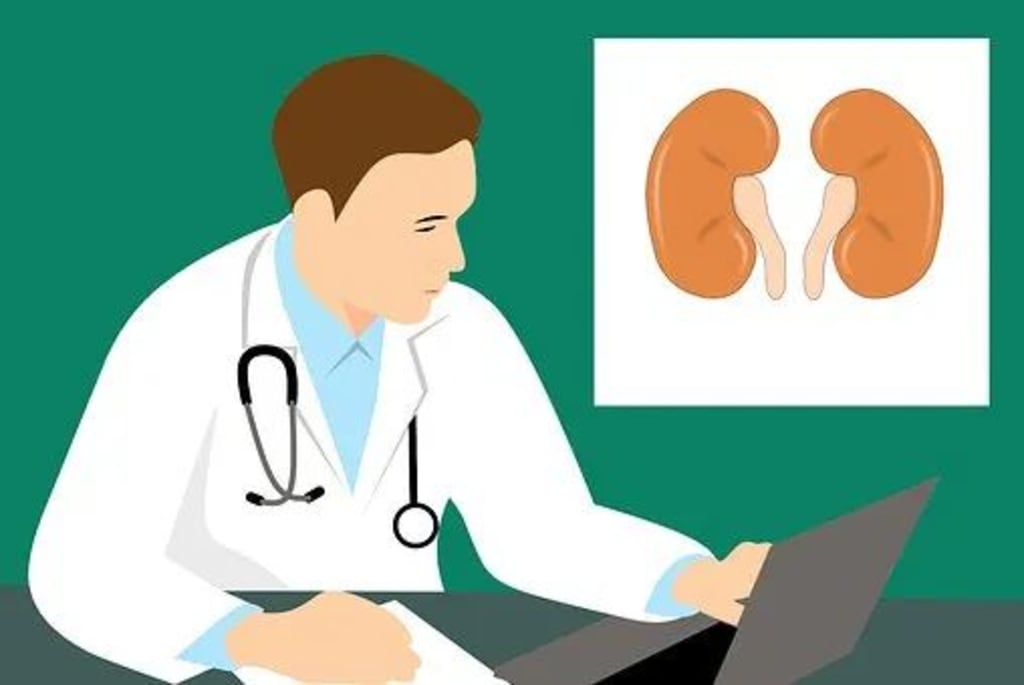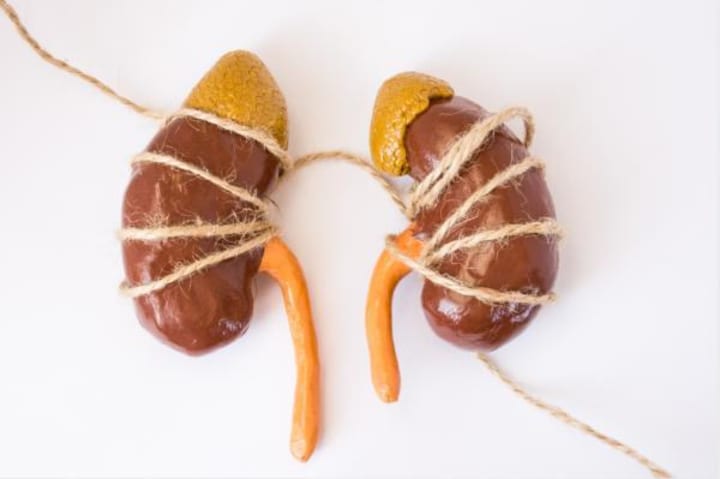The most damaging behavior of the kidney
Five signs of illness to be alert

When do the kidneys start to age? What are the "warning signs" of the body that indicate kidney problems? Does holding urine for a long time affect the kidneys? Does high blood pressure cause uremia? How to protect and maintain the kidney? Professor Wang Jianye, director of the National Geriatric Medical Center, was recently a guest of "Health Talk", a live event directed by the Publicity Department of the National Health and Wellness Commission and sponsored by Health News and the Health China governmental new media platform, and gave authoritative answers to the public's concerns about the prevention and treatment of kidney diseases.
The kidneys start to an age when people reach 40
Under normal physiological conditions, people's kidneys start to age at the age of 40, and kidney function decreases year by year. Aging is one of the reasons for kidney aging. There are 2 measures of kidney aging. One is the volume, as age increases, the size of the kidney will gradually become smaller. The second is the decrease in kidney function, which decreases by roughly 1% per year, or 10% every 10 years. If kidney function decreases from the age of 40, at the age of 80, the kidney function is only 50%-60% of that in younger years. In general, there is no difference between men and women in terms of kidney aging time.
The human body is about the balance of in and out, if a kidney disease, the doctor's greatest fear is to affect the discharge of toxins from the patient's body, that is, the patient does not have urine, especially in patients who are being resuscitated, no urine will dare to use any medicine, it is difficult to survive. Because the doctor has no treatment available, such as low blood pressure to use antihypertensive drugs, or poor heart function to use drugs to enhance heart function, all need to be through the infusion. If the patient does not urinate out, only in and out, it is life-threatening.
Five signs of illness to be alert
Some warning signs in the body indicate possible kidney problems.
First, urine examination.
This is the most basic test, also called a non-invasive test. If there is a protein in the urine for a long time, it is suspected that it may be nephritis; if there are white blood cells and red blood cells, consider the problem of infection.
The second is edema.
In addition to lower limb edema, kidney disease patients are more likely to have eyelid edema. In elderly people, for example, lower limb edema often occurs at night, which is not a big problem in most cases and we consider it to be a normal circulation in the elderly. If edema occurs in young people for a long time, and it is edema in the morning when they wake up, then we should consider that there may be a problem with the kidneys and seek medical attention from a regular medical institution in time.
The third is back pain.
Such as kidney stones, kidney tumors, etc., and patients will have back pain symptoms.
Fourth is the increase in blood pressure.
A sudden increase in blood pressure or drug control is difficult to reach the standard, and one needs to pay attention to whether the kidney disease is caused by hypertension.
Fifth, symptoms such as loss of appetite, nausea, vomiting, fatigue, and weakness.
Mistakenly think that digestive system diseases and seek medical attention. It may be due to the kidneys can not excrete toxins, affecting the digestive system.
It should be emphasized that generally speaking, kidney diseases do not have many early manifestations and are not easily detected by patients. Take back pain as an example, you may also feel that you have sprained your back and do not think of it as kidney disease. Especially for kidney tumor patients, once they have back pain, they have reached a more serious stage.
Which department should I go to when I suspect kidney problems?
It is easy for patients to confuse this issue, which involves 2 departments: nephrology and urology, both of which also have crossover. For example, urinary tract infections can be seen through both nephrology and urology. Another example is hematuria. For general carnal hematuria, it is recommended to see surgery; for microscopic hematuria, it is more appropriate to see internal medicine first. Of course, you can also ask the hospital's professional staff to help guide the consultation.
"The treatment is for stones, not for stone disease"

Regarding kidney stones, our urologists often say: "We treat stones, but not a stone disease". Generally smaller kidney stones can be urinated out by drinking more water and exercising more, and most of them can be urinated out. Large stones have a greater impact on the body, especially when they cause obstruction, and must be treated promptly. At present, there are many techniques to treat kidney stones, which are also more mature, such as extracorporeal lithotripsy and percutaneous nephrolithotomy, but which method is better still varies from person to person and from specific conditions. Currently, the cause of the occurrence of kidney stones is not yet clear, so there is still a risk of recurrence after the removal of the stones.
Under normal circumstances, each person has 2 kidneys. As an important human organ, the main function of the kidney is to detoxify and filter the waste in the blood. We have done a study that if a kidney is removed before the age of 50 due to trauma causing kidney rupture or because of a tumor, the opposite kidney is fully compensated and the kidney function will not be affected. If one kidney is removed after the age of 50, some people's other kidneys can only be partially compensated, and then the loss of compensation may occur so that the toxins in the body can not be excreted, which has a great impact on the human body.
Some hypertensive patients, in the late stages of hypertension, occurred uremia. This is because if the blood pressure is not well controlled for a long time, the blood vessels will harden, which in turn causes the kidney function to decline. It is equivalent to rusty heating pipes at home, the original inner diameter is very wide, so the home will feel very hot in winter. After 10 years of using the heating, the reason is that there is more rust inside the pipe, the inner diameter becomes very thin, and the amount of hot water passing through is very small, so the room temperature drops.
Many members of the public are concerned about whether the contrast agent has any effect on the kidneys or not.
The contrast agent contains iodine, strictly speaking, elderly people and people with poor kidney function should try to avoid it. However, for people with normal or normal kidney function, it should be fine to do it occasionally.
The most annoying behavior of kidneys
First, improper medication.
Most of the drugs need to be excreted by the kidneys, which increases the burden on the kidneys to a certain extent. It is very important to avoid taking drugs that are damaging to kidney function, especially drugs that are damaging. If you are known to have poor kidney function, you should also emphasize to your doctor when you visit him or her for other diseases, that "kidney function is worse than normal" and he or she will be alert.
The second is to hold urine.
Hold urine for a long time, the kidneys are stressed, and the kidney function will be damaged.
The third is the intake of crude protein.
Especially the elderly can eat some refined protein, such as lean meat, egg whites, etc., and less crude protein (fibrous protein), such as tofu, peanut rice, etc. Because crude protein impurities are not conducive to metabolism.
Fourth, sedentary.
Sedentary will compress the bladder meridian, causing the bladder meridian qi and blood to run poorly, the kidney meridian and the bladder meridian will also trigger abnormal kidney function.
Five is to staying up late, smoking, alcohol, and other bad habits.
These will accelerate the decline and damage of the kidneys.
Prevention is the most cost-effective health strategy. Regular health checkups are recommended, especially for the elderly. The general physical examination will include a urine routine to check if there are any problems with urine. Then there is blood pressure, blood sugar and blood lipids should be well controlled. Once they are not well controlled, they will all increase the burden on the kidneys to some extent. Pay attention from a young, then when you get older, the kidneys will age slower.
Older people with hypertension and diabetes should do the following three things.
First, do a good job of self-health management and have a clear understanding of their diseases.
Second, know that they have the disease, go to the doctor and take the medication on time.
Third, treatment to meet the standard, to control blood pressure and blood sugar to a stable level.
The risk of kidney disease in the future will be reduced.






Comments
There are no comments for this story
Be the first to respond and start the conversation.